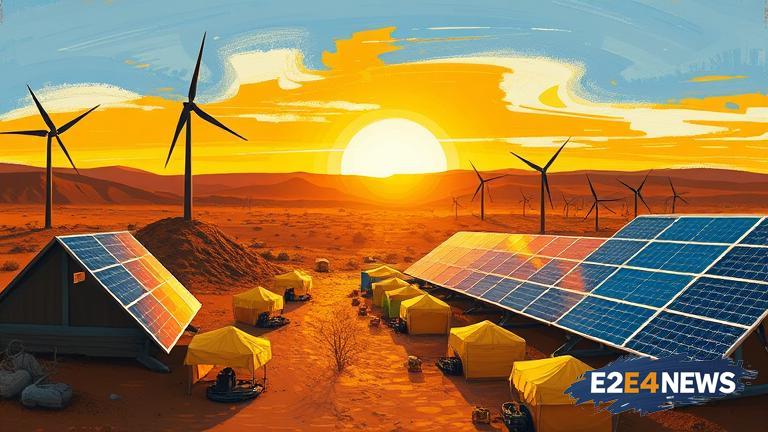The African continent is witnessing a significant shift towards renewable energy, driven by the need to address the pressing issues of energy access, energy security, and climate change. With a growing population and increasing economic activities, the demand for energy is on the rise, and renewable energy sources such as solar, wind, and hydroelectric power are becoming increasingly attractive. Many African countries are now investing heavily in renewable energy infrastructure, with a focus on solar and wind power. For instance, South Africa has set a target of generating 42% of its electricity from renewable sources by 2030, while Morocco aims to increase its renewable energy capacity to 52% by 2030. Egypt, on the other hand, has launched several large-scale renewable energy projects, including a 1.8 GW solar park in the Aswan province. The use of renewable energy is not only helping to reduce greenhouse gas emissions but also creating new job opportunities and stimulating local economies. In addition, renewable energy is becoming more competitive with fossil fuels, making it a viable option for many African countries. The cost of renewable energy technologies such as solar panels and wind turbines has decreased significantly over the years, making them more accessible to a wider range of consumers. Furthermore, the development of renewable energy infrastructure is also driving innovation and entrepreneurship in Africa, with many start-ups and small businesses emerging to provide renewable energy solutions. The African Union has also launched several initiatives to promote the development of renewable energy in Africa, including the Africa Renewable Energy Initiative, which aims to achieve at least 300 GW of renewable energy capacity by 2030. The initiative has received significant support from international organizations and donors, who are providing financial and technical assistance to African countries to help them achieve their renewable energy targets. Despite the progress made, there are still several challenges that need to be addressed, including the lack of infrastructure, limited access to financing, and the need for policy and regulatory frameworks that support the development of renewable energy. However, with the continued support of international organizations and the growing commitment of African governments to renewable energy, the continent is poised to make significant strides in the coming years. The development of renewable energy in Africa is also expected to have a positive impact on the environment, by reducing greenhouse gas emissions and mitigating the impacts of climate change. In addition, renewable energy can also help to improve energy access, particularly in rural areas where many communities lack access to modern energy services. The use of renewable energy can also help to reduce energy poverty, by providing affordable and reliable energy to low-income households. Overall, the future of renewable energy in Africa looks promising, with many opportunities for growth and development. As the continent continues to transition towards a low-carbon economy, it is likely that renewable energy will play an increasingly important role in meeting Africa’s energy needs. With the right policies and investments in place, Africa can unlock its vast renewable energy potential and achieve a sustainable energy future. The benefits of renewable energy are numerous, and African countries are now recognizing the importance of transitioning to a low-carbon economy. The development of renewable energy infrastructure is also expected to attract significant investment to the continent, creating new economic opportunities and stimulating growth. In conclusion, the renewable energy revolution in Africa is gaining momentum, driven by the need to address the pressing issues of energy access, energy security, and climate change. With the continued support of international organizations and the growing commitment of African governments to renewable energy, the continent is poised to make significant strides in the coming years.
